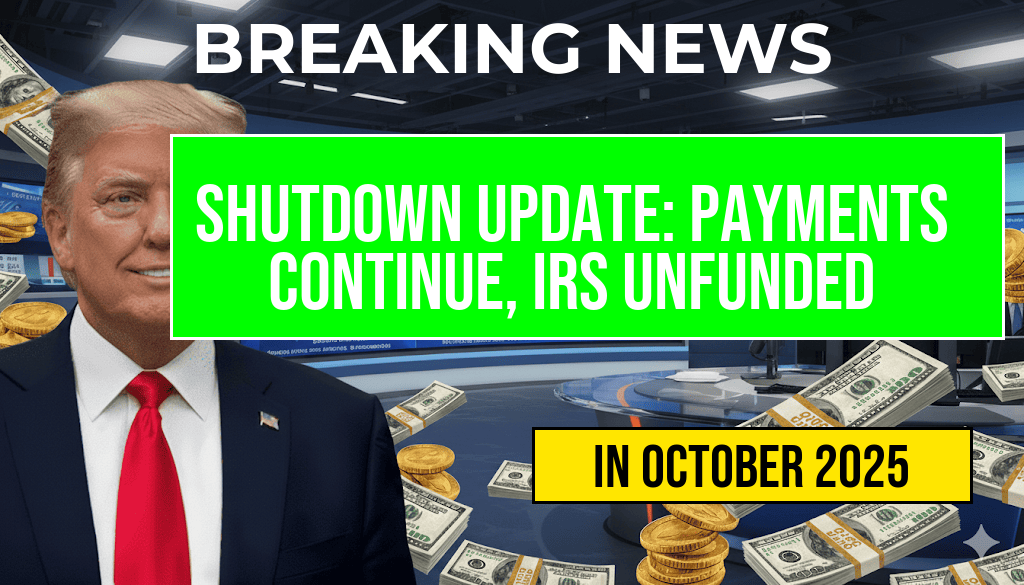Shutdown Update: Social Security Payments Continue While IRS Help Desks Remain Unfunded
Amidst the ongoing government shutdown, vital social programs like Social Security continue to operate smoothly, with payments arriving on schedule for millions of beneficiaries. Conversely, the Internal Revenue Service (IRS) has seen its help desks and taxpayer assistance programs left unfunded, leaving many Americans without direct support for filing taxes or resolving issues. This contrast underscores the uneven impact of the shutdown on different federal agencies, highlighting how essential services are prioritized over administrative functions that depend on discretionary funding. As lawmakers debate funding measures, the situation raises questions about how long core social programs can sustain operations without interruption, while support services face limitations due to lack of resources.
The Department of Health and Human Services confirmed that Social Security payments are being processed without disruption, providing reassurance to retirees, disabled individuals, and their dependents who rely on these funds for daily living expenses. Meanwhile, the IRS has suspended most in-person assistance at taxpayer centers, and many online services are limited or unavailable. The shutdown, now entering its third week, illustrates a clear divide: essential benefits continue uninterrupted, yet the backbone of tax administration and taxpayer support faces significant operational challenges.
Impact on Social Security and Other Essential Services
The resilience of Social Security payments reflects the agency’s status as a mandatory spending program, which is less susceptible to funding lapses compared to discretionary programs like IRS services. The Social Security Administration (SSA) has assured beneficiaries that payments scheduled for the upcoming month will proceed as usual, regardless of the shutdown. This is critical for the roughly 65 million Americans who depend on Social Security, especially as inflation and rising living costs strain household budgets.
Sources familiar with the SSA’s operations note that the agency maintains a reserve fund that helps ensure uninterrupted payments during funding gaps. However, the agency has also cautioned that long-term shutdowns could eventually impact administrative functions such as benefit processing or new applications. Currently, though, the SSA continues to operate on a skeleton staff, prioritizing payment processing over other non-essential functions.
IRS Services and the Cost of Unfunded Operations
In stark contrast, the IRS has largely halted in-person assistance and scaled back its phone support. Taxpayer assistance centers across the country are closed, and many online tools are limited or offline, making it difficult for individuals and businesses to get help with tax questions or resolve issues. The agency’s website notes that some services are unavailable until funding is restored, which could delay tax refunds and hinder compliance efforts.
The IRS’s operational struggles highlight the broader consequences of the shutdown on tax administration. With fewer resources, the agency faces increased backlog and reduced capacity to conduct audits, process returns, or assist taxpayers during a critical period ahead of tax deadlines. Experts warn that prolonged closures could create ripple effects, including delays in refunds that many Americans rely on for financial stability.
Political Dynamics and Funding Battles
The ongoing shutdown stems from disagreements in Congress over budget allocations, particularly regarding funding for border security measures and other policy priorities. While essential services like Social Security are protected by law from shutdown impacts, agencies reliant on annual appropriations, such as the IRS, are vulnerable to funding lapses.
Lawmakers continue to negotiate, with some advocating for temporary funding measures to reopen agencies and restore full services. The debate underscores the complex interplay between political priorities and the operational realities faced by federal agencies. The Biden administration has emphasized the importance of safeguarding social programs, while congressional leaders grapple with broader fiscal disagreements.
Public Response and Future Outlook
Beneficiaries and taxpayers alike are feeling the effects of the shutdown differently. Retirees and disabled individuals are reassured that their payments continue, but many small businesses and taxpayers face uncertainty due to limited access to IRS support. Financial analysts warn that delays in tax processing or refunds could have broader economic implications if the shutdown persists.
As negotiations continue, experts suggest that a short-term funding agreement could mitigate immediate disruptions but warn that prolonged deadlock risks more severe consequences for government operations. The situation remains fluid, with the potential for further impacts if a resolution is not reached soon.
Key Takeaways
| Service | Status | Notes |
|---|---|---|
| Social Security Payments | Unaffected | Payments continue on schedule; minimal operational impact |
| IRS In-Person Assistance | Unfunded / Limited | Centers closed; online services limited; delays expected |
| Tax Processing | Reduced capacity | Backlog possible; refunds may be delayed if shutdown prolongs |
As the political impasse continues, the contrast between the resilience of social safety nets and the vulnerability of administrative services highlights the importance of stable funding for critical government functions. The coming weeks will determine whether a bipartisan agreement can restore full agency operations or if the shutdown’s impact deepens across American households and the economy.
Frequently Asked Questions
Question
Will Social Security payments be affected during the government shutdown?
Answer
No, Social Security payments will continue to be issued as usual despite the ongoing government shutdown.
Question
Are IRS help desks operational during the shutdown?
Answer
No, IRS help desks remain unfunded and are not available to assist taxpayers during the shutdown period.
Question
How can I get assistance if the IRS help desks are unavailable?
Answer
Taxpayers can access online resources on the IRS website or use self-service tools for assistance while help desks are unfunded.
Question
Will the shutdown delay or impact other government services?
Answer
Yes, many government services may experience delays or disruptions, but essential payments like Social Security are prioritized to continue without interruption.
Question
When are the IRS help desks expected to reopen?
Answer
The reopening of IRS help desks depends on the resolution of the government shutdown; they will resume operations once funding is restored.










